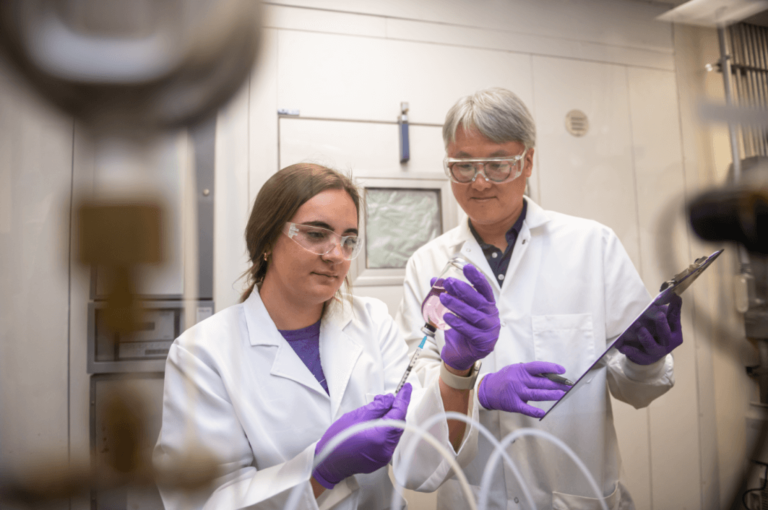
In the intricate tapestry of daily life, civil engineers weave the threads that bind communities together. Their impact is omnipresent, from the clear water that flows through our taps to the sturdy bridges that carry us on our journeys. Civil engineers are the unsung heroes in sustainability, treating waste to safeguard our environment and harnessing water resources for clean, renewable power.
In a world fueled by technology, the role of civil engineers has evolved. Thanks to recent leaps in computing, information systems, and biotechnology, they can now deliver cutting-edge solutions that balance our quest for a high quality of life with the imperative to preserve our precious natural resources.
Numbers tell the story, too. The field has a projected 5% job growth by 2032. The profession shapes the present and moulds the future, building the foundations for sustainable living and resilient infrastructure. For those passionate about innovation and a commitment to bettering society, being a civil engineer is more than a career — it’s a calling.
Here are three US universities that you can consider:
Kansas State University
Kansas State University’s (K-State) Carl R. Ice College of Engineering boasts a century-long legacy, etching its mark as a top-tier institution that provides quality education within a research environment that develops tomorrow’s leaders. The Department of Civil Engineering is part of this illustrious college.
It offers dynamic graduate and research programmes, each a gateway for students to achieve leadership roles across industry, academia, and government sectors. Here, students can pursue comprehensive programmes that lead to master’s and doctoral degrees, specialising in environmental and water resources engineering, geotechnical engineering, structural analysis and design, and transportation and materials engineering.
At its core, the Department of Civil Engineering is a community of learners taking part in exceptional educational opportunities. Beyond the classrooms, groundbreaking research in civil infrastructure design and environmental preservation defines the department’s commitment to addressing today’s and tomorrow’s challenges.
From state-of-the-art laboratories to nationally recognised student chapters and successful research programmes, these features cement the department’s reputation as a hub of innovation and progress. With no plans of slowing down, the department is pressing forward with research projects tackling the 14 engineering grand challenges, particularly those addressing urban infrastructure improvement and access to clean water.
If you’re seeking an impactful programme in a friendly, safe, and welcoming campus located in Manhattan, a semi-rural city with low-cost living, click here. Funding opportunities are available for research assistantships.

Civil engineering classes are taught by experienced faculty who specialise in cutting-edge research and practice. Source: Drexel University/Facebook
Drexel University
Located in Philadelphia, Drexel University is home to over 23,000 students at its 15 colleges and schools. Even though its history dates back to 1891, it is very much in tune with technology and innovation; for example, in 2000, it was the first university to have a totally wireless campus.
The Department of Civil, Architectural and Environmental Engineering (CAFE) is home to a diverse group of faculty, staff, and students dedicated to developing innovative solutions to some of the most pressing societal problems of our time, such as climate change, sustainability, and resilience.
Robust faculty and graduate student research activities are a cornerstone of this department. Together, they work on projects ranging from restoring and repairing society’s transportation infrastructure to green infrastructure planning and modelling. All these take place in fully equipped laboratory spaces used for education and research opportunities.
Graduate programmes are dynamic. The MS in Architectural Engineering has a flexible curriculum. Study track options include taking coursework only, a report similar to a mini thesis, or a full MS thesis presented to two committee members. Out of 45 credits, you can take 24 credits in a major field of interest and six credits are reserved for maths requirements. This degree will allow you to build your knowledge in indoor environmental quality or building energy efficiency and alternative energy.

University of California, Riverside is named as one of the top 20 best public global universities for engineering in 2022. Source: University of California, Riverside/Facebook
University of California, Riverside
There are many reasons why students across the globe choose the University of California, Riverside’s Marlan and Rosemary Bourns College of Engineering (BCOE). It is ranked as one of the top 60 best public engineering colleges in the US, according to US News and World Report. The campus has a strong community and vibrant feel. Academic advising supports the well-rounded development of engineering students in their degree pursuit, career preparation, and readiness for global citizenship.
In 2023, five programmes at BCOE moved up in rank in the 2023 US News and World Report Best Engineering Graduate Schools Rankings for good reasons. Here, students work on solutions to real-world problems, backed by a full support system of faculty, advisors and staff. Beyond this, the college houses 11 world-class research centres.
When you choose the University of California, Riverside, you choose a world-class institution that will prepare you to be a key contributor to society through your technological, professional and personal skills. And the college offers a wide range of programmes that cover fields such as Bioengineering, Chemical and Environmental Engineering, Computer Science and Engineering, Electrical and Computer Engineering, Mechanical Engineering, Computer Engineering, Data Science, Materials Science and Engineering, and Robotics.
*Some of the institutions featured on this article are commercial partners of Study International










